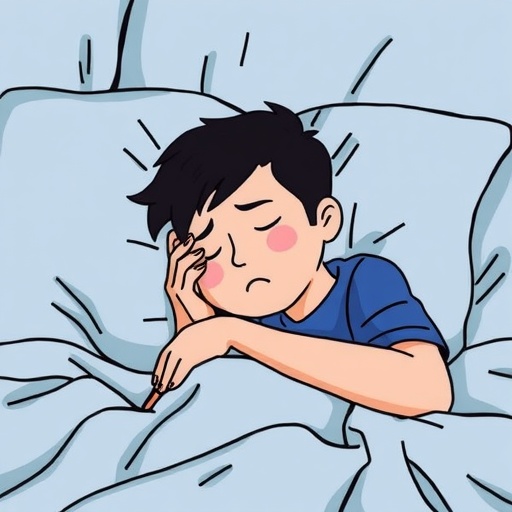Emerging evidence from the University of Warwick has unveiled a compelling link between adolescent sleep disruptions and the alarming escalation in suicide attempts during late teenage years. This groundbreaking longitudinal study sheds light on how insufficient and fragmented sleep patterns at age 14 significantly increase the likelihood of suicide attempts by 17, opening a crucial dialogue on the biological and cognitive vulnerabilities intertwined with adolescent mental health.
Suicide remains a leading cause of death amongst adolescents in the United Kingdom, warranting urgent attention towards underlying risk factors. While it is widely recognized that teenagers often suffer from sleep deficits influenced by a complex interplay of hormonal changes, social pressures, and environmental factors, the direct longitudinal impact of such sleep disturbances on suicidal behaviors has been insufficiently understood—until now. This research taps into a rich dataset to elucidate these connections with unprecedented clarity.
Drawing from the extensive Millennium Cohort Study, which follows over 8,500 young people born around the turn of the millennium, researchers analysed self-reported sleep data and instances of suicide attempts over a three-year span. The detailed examination revealed that adolescents reporting shorter time spent in bed during school nights, combined with frequent nocturnal awakenings at age 14, were disproportionately more prone to attempting suicide at age 17. These findings contextualize sleep quality as not merely a symptom but an independent and potent risk factor for adolescent suicide.
The investigation accounted for a myriad of confounding factors traditionally associated with suicide risk, including socioeconomic status, self-harm history, and diagnosed mental health challenges. Remarkably, the sleep variables retained their prognostic significance even after adjusting for these well-established risk factors. This underscores the unique and pivotal role that sleep disturbances play in shaping adolescents’ vulnerability to suicidal ideation and acts.
Moreover, the strength of shorter total time in bed and frequent awakenings outstripped that of depressive symptoms and multiple psychosocial risk markers, suggesting that impaired sleep might have a more crucial and direct implication in suicide risk than previously acknowledged. This revelation invites a recalibration of current mental health screening and intervention strategies to prioritize sleep assessment as a frontline component in adolescent care.
Importantly, the University of Warwick team was the first to integrate cognitive dimensions, assessing how decision-making capacities interact with sleep disturbances to modulate suicide risk. Using a cognitively demanding tool—the Cambridge Gambling Task—the researchers identified that adolescents with enhanced rational decision-making skills exhibited resilience against the suicide risk amplified by night awakenings. Nevertheless, this protective cognitive effect diminishes as sleep disruption becomes more frequent, indicating a threshold beyond which cognitive faculties are overwhelmed by sleep deficits.
From a neurodevelopmental perspective, these insights beckon further inquiry into the mechanistic pathways through which sleep deprivation undermines executive function during this critical maturation phase. Sleep fragmentation is known to destabilize neural circuits involved in emotional regulation and impulse control, potentially rendering adolescents susceptible to despair and poor judgment. The findings encourage a focused exploration of how enhancing sleep might bolster cognitive defenses and mitigate risk.
Senior author Professor Nicole Tang astutely highlights the gravity of sleep problems, emphasizing that habitual sleep deprivation and fragmentation are not trivial complaints but stressors capable of eroding psychological resilience. This erosion can precipitate life-threatening decisions. Early detection and therapeutic interventions aimed at improving sleep hygiene could thus embody an effective component of suicide prevention frameworks, reducing the incidence of tragic outcomes among vulnerable youths.
The implications of this research ripple beyond clinical settings, suggesting that educational policies and family practices must adapt to promote adequate sleep among adolescents. The pervasive culture of late-night screen exposure, academic pressures, and social engagements interferes with natural sleep rhythms. In light of this study, societal recognition of sleep’s role in safeguarding mental health warrants urgent reinforcement and reshaping of adolescent lifestyles.
Technologically, innovative solutions such as wearable sleep trackers and cognitive behavioral therapy for insomnia (CBT-I) present promising avenues for real-time monitoring and management of adolescent sleep quality. Integration of such tools into public health initiatives could revolutionize early intervention strategies and personalize support for at-risk teenagers.
The release of this study in the peer-reviewed journal Sleep Advances adds a critical dimension to our understanding of adolescent suicide risk, paving the way for multidisciplinary research that bridges neuroscience, psychology, and public health. Its longitudinal design provides robust evidence for causation rather than mere correlation, advocating for sleep intervention as a tangible, modifiable target.
In summary, this pioneering research from the University of Warwick elucidates the pivotal role that sleep disturbances in early adolescence play in shaping suicide risk later in teenage years. By demonstrating that poor sleep is a standalone risk factor and highlighting the interplay with cognitive functions like decision-making, the study calls for a paradigm shift in both research and practical approaches to adolescent mental health. Expanding sleep duration and reducing fragmentation could emerge as crucial preventative strategies, saving lives and transforming futures.
Subject of Research: People
Article Title: Sleep Problems, Decision-Making, and Suicide Attempts During Adolescence: A Longitudinal Birth Cohort Study
News Publication Date: 23-Oct-2025
Web References: http://dx.doi.org/10.1093/sleepadvances/zpaf062
Keywords: adolescent sleep, suicide risk, longitudinal study, fragmented sleep, decision-making, cognitive resilience, mental health, suicide prevention, adolescent development, sleep deprivation, Cambridge Gambling Task, sleep fragmentation




